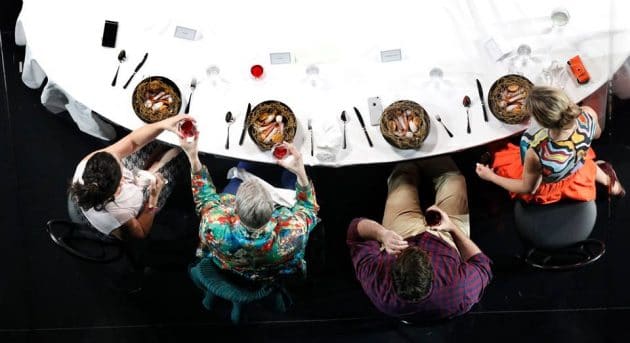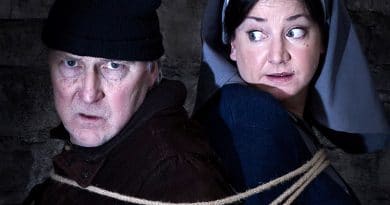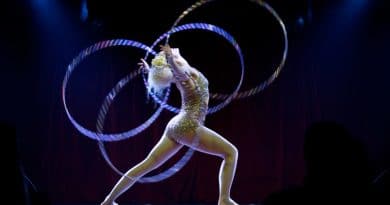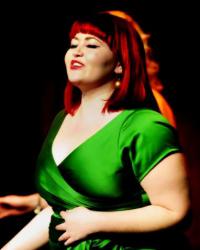Musical theatre and opera merge: Banquet of Secrets an evolutionary move for Victorian Opera
When it comes to the mechanics of the intersection and amalgamation of operatic and musical theatre performance in Australia, it seems to me that nobody does it better than Victorian Opera. Following three successful productions of Sondheim classics over their most recent seasons, the company is preparing for this evening’s first performance of a new project, a commissioned work of musical theatre that seeks to further blur the lines of musical theatre and operatic theatricality by bringing an extra creative element to the stage. This element, as you may have guessed by the title of the piece, will be culinary in nature.
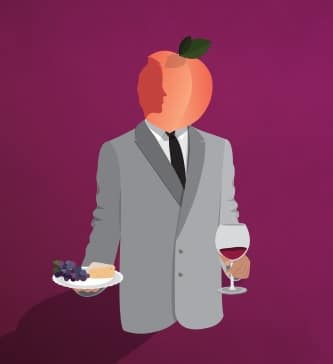
Speaking to Andrew Snell (managing director of the company), the reason for Victorian Opera’s expansion into musical theatre over the last few years becomes apparent. As well as an eleven year old constitution that states the company will produce both styles of performance for the stage, Snell believes that the art forms of musical theatre and opera are not necessarily defined as separate performance genres any more.
“I think if you look around the world, the lines between opera and musical theatre are becoming ever more blurred and ever greyer… It’s one of those inevitable evolutionary parts of what we do. The Sondheim works, particularly the ones we chose [to present] are so close to being operatic performances and operatic productions so there’s almost no dividing line between them. [Sondheim musicals] are a huge sing and they require properly trained voices to make them work, so they actually sit quite nicely into the general operations of an opera company.
“In the case of Banquet of Secrets, we commission on a regular basis, but we’ve actually never commissioned a musical before. We thought it was about time we did one, and at the same time the opportunity for Banquet of Secrets was presented to us by Paul and Steve, so we took the opportunity with both hands.”
Snell also mentions that varying the material the company produces and constantly changing the way these productions are delivered is a strategy that has won over hearts of both casual audiences and those who hold a Victorian Opera membership in a culture that often pushes classical art forms into obscurity.
“You’re absolutely right, opera is seen by the general population out there as stuffy, unchangeable, and a relic of the past. One of the biggest problems that all opera companies have in a sense, is the word ‘opera’, because of that level of public perception. We find that if we can get an audience through the door to experience what it is that we do on stage they very often come back, but the hardest job is getting them through the door in the first place.
“While the heritage of opera is a very important thing (as it is for all art forms), no art form can just become a museum piece. Any art form has to reinvent itself and has to develop to survive… As a result we take that part of opera very seriously. We commission a lot, we do community engagement work… [Victorian Opera] believes that it’s not just about going out there and doing work for a certain cross-section of society. We try and create work that will be interesting to young people, to older people, […] to the musical theatre community, the traditional opera community, people who like contemporary work – whether that be theatre, dance, or anything else. It’s a big picture vision of the operatic art form having to develop and evolve. There’s a reason evolution has worked throughout the natural world, and evolution has to work in the arts.”
Although Banquet of Secrets marks their first foray into commissioning a piece of musical theatre, over their eleven years of operation Victorian Opera have generated sixteen new works. According to Snell, the development of new performance pieces is hugely important to the company, and to the future of the operatic art form itself.
“Our basic commissioning process works on a three year cycle, so we commission a work, then in the second year there is a developmental phase where we might have a week long workshop, and then the third year is the presentation year. It varies depending on the complexity of the work and whether we can find a theatre space to put it on in, but we generally do that every year. In other words, we commission one show each year and in the same year there is a show in a workshop process and another one is being presented to an audience. Over the life of the company we have presented at least one new work every year, and this year we’ve actually got four.”
“Again, it’s really all about this evolution… Audiences do want to see heritage works, but they want to see the next generation too, the new and exciting things. […] No one has any idea what they’re going to get with Banquet of Secrets, and that makes it a really interesting night in the theatre for everybody.”
Featuring “an elaborate on stage degustation” designed by French chef Philippe Mouchel, Banquet of Secrets is described by Snell as a happy accident of synergy, with collaborative elements and relationships spanning multiple specialities falling into place with little effort. Victorian Opera hope to keep evolving and experimenting with the operatic art form in the future, aided by the support of their diverse and changing audience.
“A relatively significant achievement for us is the fact that we still exist. [Victorian Opera is] doing the things that we are asked to do by government, and the things the ticket buying public want us to do, and we want to keep doing it. We see it as really important for the future of the art form of opera in general that we keep doing this kind of work. [Going into the future] we really want to push the new work side of what we do, probably above everything else because it’s the future of opera.”
If you are interested in booking a ticket to support Victorian Opera’s first original musical theatre endeavour, please follow this link. You can also find out more about their youth performance programs, youth audience programs, rural tours and a multitude of other pioneering initiatives employed by the company by visiting their website.

